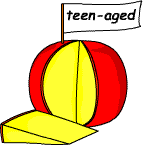Cheese
Created | Updated Apr 27, 2002

Cheese is a manufactured confusion of milk, germs, heat and time that is used by humans to demonstrate their unique position in the world. Thus, French people have developed their Frenchness through the making of soft Bries and Camemberts. Norwegians have become Norwegian through the consumption of chunky Jarlsbergs and toffee-like goat's cheese. Italians thrive on soggy mozzarella and elastic Telaggio.
Take the cheese out of a nation, and the sense of a nation is gone. Only the Chinese and the Hawaiians are likely to survive the cheese holocaust that will surely come. And even they are not safe in a cheeseless world - China being the world supplier of cocktail sticks and Hawaii's economy relying so heavily on the production of pineapples.
In Britain, the sense of belonging developed through cheese is so strong that rural communities vie for regional brands. It is now possible, for example, to buy Scottish Cheddar, Double Gloucester made in Staines, and 'Norfolk' Stilton. Sometimes, as with Wensleydale, cheeses are created in order to establish a community. It is rumoured, for example, that Milton Keynes was a cheese long before it became a place.
America - a land of immigrants - has maintained its peculiar sense of nationhood through such innovations as spray-on cheese, cheese slices and - in the great tradition of American hucksterism - aerosol cheese.
Out of the great cheese eating nations, only the Dutch have maintained a sensible and rational approach to dairy produce. They alone have realised that there are in fact just three types of cheese in the world - old cheese, young cheese and cheese that is not fit for human consumption. History has conspired to make the Dutch seem like the rest of us with their Edam and the Gouda. But a trip to the notorious cheese district of Amsterdam quickly dispels this myth. Here you buy your cheese as you would buy your gin by its age, not its locale. If you are seeking a ripe variety, hard as your uncle and as smelly as your aunt, you ask for 'old cheese'. Or perhaps you would like to try a tasty slice of 'teenage' Edam. Or a lump of custard-yellow baby' cheeses, fresh from the womb and wrapped in salami?
Cheese that is deemed not fit to eat in Holland (all Bavarian smoked cheese, for example) is fed to the cats.
